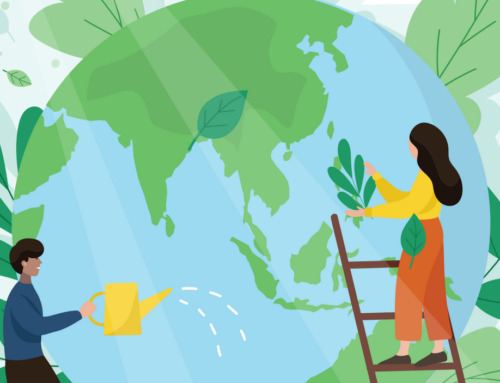
Round table: Paul Schenderling, Lebohang Liepollo, Katy Wiese, Jason Nardi, Christian Felber (clockwise) and Kate Raworth (on screen).
Visionaries’ Gathering for Change
From June 3 to 5, the III Economy for the Common Good International Conference (ECGIC 2024) was held in the Netherlands. This event was organised by a consortium made up of Wetsus, a water research institute; the NHL Stenden and Hanze-Gronigen Universities of Applied Sciences; and the Science and Research Hub of ECOnGOOD’s International Federation.
Surrounded by the beautiful scenery of Leeuwarden’s channels, the third edition of the international conference was successfully held, each year elevating quality of speakers and content. The ECGIC 2024 counted with the attendance of 230 participants hailing from over 12 countries. Attendees enjoyed a thorough vision of the current social, economical and political context and concrete proposals towards the advancement of just and sustainable regions. Within the framework of scientific presentations and cases, participants had the opportunity to discuss their research with colleagues, consolidating contributions to improve living conditions while achieving sustainability globally.
The conference featured insightful talks from 8 keynote speakers, each an expert in their field. In addition, a round table discussion was held, featuring representatives from five economic models, including the Well-Being Economy Alliance, Care Economy, Doughnut Economics, Social and Solidarity Economy, and the Economy for the Common Good (ECG). The three-day program included as well poster exhibitions based on accepted abstracts and parallel sessions. The academic contributions were extensive, comprising 44 scientific paper presentations, 8 posters, and 10 practical cases.
A brilliant Kate Raworth from Doughnut Economics highlighted the great moment we find ourselves in: there is a growing interest in learning and using the tools of the real economy, as global economic organisations and institutions begin to question capitalism. Economy for the Common Good (ECG) founder Christian Felber and Jason Nardi from the Social Solidarity Economy pointed out current opportunity born of regulatory institutions and the creation of measurement standards, to ensure that key indicators are included and ensure a participatory and transparent elaboration.
Among other relevant contributions, Lebohang Liepollo from the Wellbeing Economy Alliance (WEAll), denounced the large outstanding debt with the great south, which does not involve symbolic aid, but rather to halt exploitation altogether. Paul Schenderling reflected on sufficient consumption and opened a space for participants to contribute through postgrowth analysis. Moderator Katy Wiese masterfully led the discussion and lively participation in the form of questions and reflections from the audience.
Other key topics included social and environmental impact, democracy and governance systems, macroeconomic measurement systems that could complement or substitute the GDP, Post Growth, water management, diversity, gender equality, and the restoration of the global south by the north.
The last day presented a more hands-on approach, involving participants in workshops to gather relevant ideas and experiences to propose action points and research objectives. The agenda culminated in a written manifesto outlining the path towards justice and sustainability, with a summary publication to follow soon. This document will contain guidelines and specific proposals for civil society, governments, the scientific community and the business sector.
Convergence towards the real economy
The participants, aware of the symbolic relevance of the grassroots movement headquarters, made a commitment to stop calling themselves alternative economies and postulate themselves as a real economy. For this purpose, certain steps were agreed upon:
- Create a common, accessible, open-sourced vocabulary for the real economy
- Create formal and systematic links between movements
The significant success of this international conference hinged on the historical milestone of gathering leading representatives in the field of alternative economics dedicated to providing a vision that goes beyond the neoliberal paradigms so consolidated in the global economic vision.
For more information on the event, visit the official website and watch the aftermovie here.
Join the online community
The ECGIC 2024 served as an in-person gathering for scientists, researchers, academics, students, and practitioners. If you weren’t able to participate or want to continue exchanging ideas with likeminded groups and individuals, join the ECG Science and Research LinkedIn Community.






